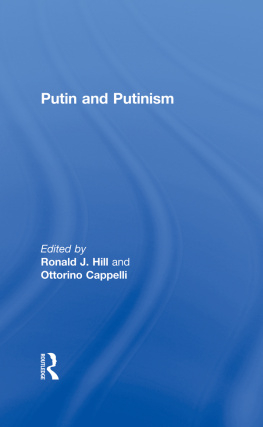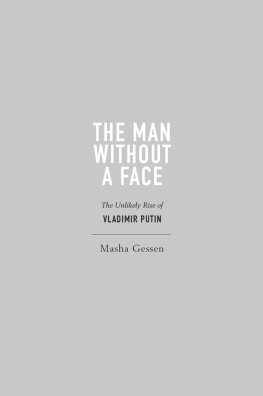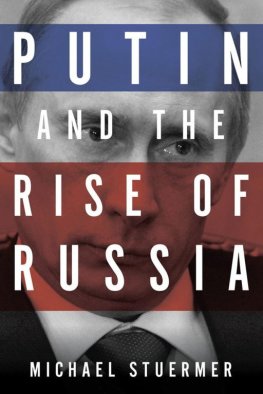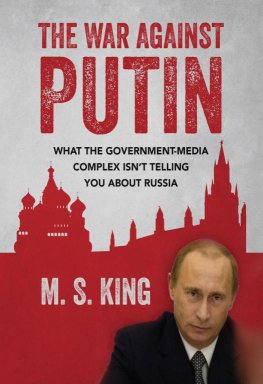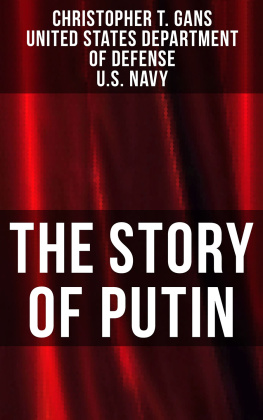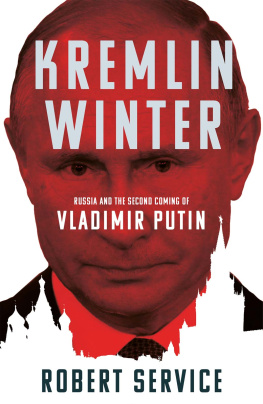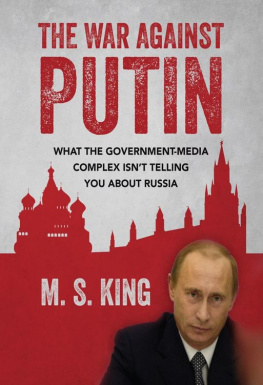Putin and Putinism
After two terms as president of the Russian Federation, Vladimir Putin handed over to his hand-picked successor Dmitri Medvedev on 7 May 2008, and became prime minister. As president, Putin moved swiftly and effectively to overcome the chaotic legacy of his predecessor, post-Soviet Russias first president Boris Yeltsin. Focusing on rebuilding the authority of the Russian state and taking advantage of the rise in world prices of the countrys main asset - oil and natural gas - Putin won unassailable popularity at home and caused apprehension around the world, particularly in Russias immediate neighbourhood. His methods of rule caused anxiety among liberals and democrats inside Russia and abroad. The legacy of Putins presidency poses challenges that demand interpretation. He has not departed from the Russian or the world political scene, and the need to understand and come to terms with Putins Russia has not diminished.
These essays by an international team of authors are based on presentations to a working conference held in Naples, Italy, in May 2008, supplemented by contributions from authors who were not present at the conference, in order to present a wider selection of views and interpretations of the Putin phenomenon.
This book was published as a special issue of Communist Studies and Transition Politics.
Ronald J. Hill is Fellow Emeritus and former Professor of Comparative Government, Trinity College Dublin, Ireland. He has published widely on Soviet, Communist and Russian affairs.
Ottorino Cappelli teaches Political Science and Comparative Politics at the Universit di Napoli LOrientale.
Putin and Putinism
Edited by Ronald J. Hill and Ottorino Cappelli

First published 2010
by Routledge
2 Park Square, Milton Park, Abingdon, Oxon, OX14 4RN
Simultaneously published in the USA and Canada
by Routledge
270 Madison Avenue, New York, NY 10016
Routledge is an imprint of the Taylor & Francis Group, an informa business
2010 Taylor & Francis
All rights reserved. No part of this book may be reprinted or reproduced or utilised in any form or by any electronic, mechanical, or other means, now known or hereafter invented, including photocopying and recording, or in any information storage or retrieval system, without permission in writing from the publishers.
British Library Cataloguing in Publication Data
A catalogue record for this book is available from the British Library
ISBN10: 0-415-49986-0
ISBN13: 978-0-415-49986-6
Contents
Ronald J. Hill
Ken Jowitt
Vladimir Shlapentokh
Ottorino Cappelli
Rita Di Leo
Olga Kryshtanovskaya
Stephen White and Ian McAllister
Andrei Rogatchevski
Ottorino Cappelli teaches Political Science and Comparative Politics at the Universit di Napoli LOrientale.
Ronald J. Hill is Fellow Emeritus at Trinity College, Dublin, where he served as Professor of Comparative Government until 2007.
Ken Jowitt is the Pres and Maurine Hotchkis Senior Fellow at the Hoover Institution, Stanford University, and the Robson Professor of Political Science at the University of California, Berkeley (Emeritus). His books include New World Disorder: The Leninist Extinction (1992).
Olga Kryshtanovskaya is Director of the Institute of Applied Politics and a department head at the Institute of Sociology of the Russian Academy of Sciences, and visiting professor at Glasgow University. She has published widely on Russian elite politics, including Anatomiya rossiiskoi elity (2005) and a series of articles in EuropeAsia Studies, Post-Soviet Affairs, Mir Rossii and other journals. This article is based on the text of a lecture presented in Moscow under the auspices of Polit.ru, which in turn served as the basis of the authors contribution at the Naples conference on the Putin presidency. Translated by Stephen White.
Rita Di Leo is Professor of International Relations at the University of Rome, Sapienza.
Andrei Rogatchevski is Senior Lecturer in Russian at the University of Glasgow. He has also taught in Finland, Germany and the Czech Republic. His publications include Bribery and Blat in Russia (2000; co-edited with Stephen Lovell and Alena Ledeneva) and A Biographical and Critical Study of the Russian Writer Eduard Limonov (2003).
Vladimir Shlapentokh is a professor of sociology at Michigan State University. He is the author of numerous books on Soviet and post-Soviet society.
Stephen White is James Bryce Professor of Politics at the University of Glasgow, and Ian McAllister is Professor of Political Science at the Australian National University in Canberra. They are currently engaged on a project on managed democracy with the support of a collaborative award from the Economic and Social Research Council (UK) and the Australian Research Council.
Rus United
KEN JOWITT
As president, Vladimir Putin has set about the rebuilding of Russias statehood in an effort to replace the weak, feudalistic state inherited by Boris Yeltsin with a mercantilist state-nation.
Big Money as an Obstacle to Democracy in Russia
VLADIMIR SHLAPENTOKH
Established Western social science theory equates democratization with rising levels of wealth and the associated establishment of a middle class that has an interest in the peaceful resolution of conflict through a political process. The case of Russia under Putin suggests that there is no necessary link between wealth as such and democratization. During his two terms as president, Putin benefited enormously from the rapid rise in world oil prices, but this economic security did not translate into liberal democratic political practices quite the reverse. Indeed, the swift pace of economic growth and rising standard of living has not pushed Russias rulers in the direction of democracy but, rather, has encouraged a form of authoritarianism that in its use of rewards for favourites and supporters is reminiscent of aspects of feudal rule. The Russian middle class, secure in its wealth, is not a bulwark of democratic values, and those who have spoken out and, more importantly, acted in support of democratization have been silenced. It is Russias poor, rather than the wealthy elite, who are critical of Putins anti-democratic actions. The transfer of office from Putin to Medvedev in May 2008 is unlikely to change this tendency.
Pre-Modern State-Building in Post-Soviet Russia
OTTORINO CAPPELLI
Transitology, or the study of transitions from communist rule to what was expected to be applications of Western-style democracy, suffered from fatal misapprehensions that ensured its failure to explain, predict or effectively guide the developments that took place during the 1990s. In particular, it lacked a historical dimension, and it misunderstood the proper function of the state in establishing a political regime. Stateness, or state strength, is an essential variable, and the acquisition of that quality is vital. It involves two fundamental aspects: asserting the states political autonomy from the social context, i.e. its ability to formulate interests of its own, and establishing its governmental capacity, or the states ability to achieve its goal. Historical analogies with feudal and absolutist political regimes are helpful in explaining the task that confronted Putin on assuming office as the designated heir of the chaotic legacy of Boris Yeltsin. The assertion of state power under Putins leadership should not be seen as an authoritarian reversal that followed a democratic wave, but is comparable with the pre-modern process of state-building that took centuries following the decline of feudalism in Western Europe. Whether the Russian state will strengthen and become an institutionalized democracy following the European sequence remains unclear; but even democratic leaders need a government able to control the governed.
Next page
